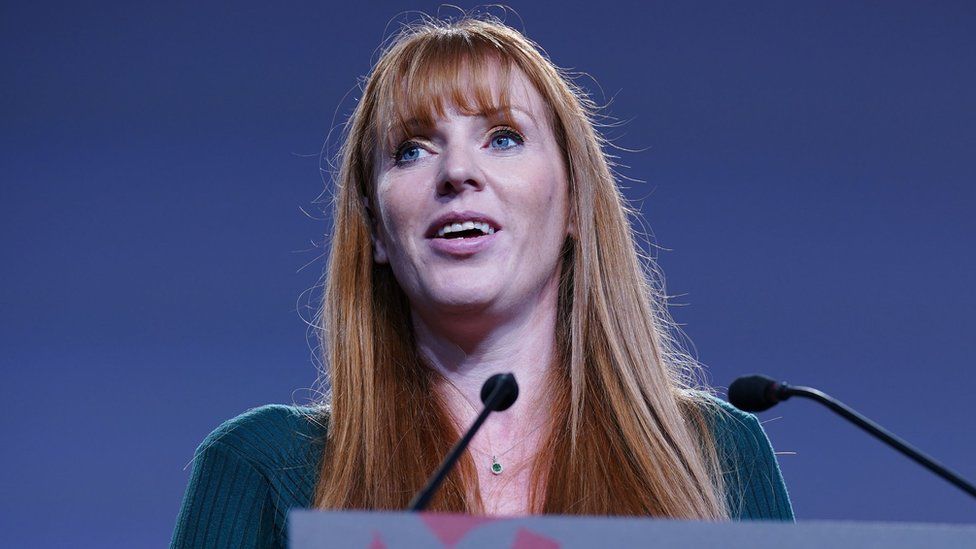ARTICLE AD BOX
 Image source, PA Media
Image source, PA Media
By Paul Seddon
Politics reporter
Labour's deputy leader has refused to promise to raise the state pension in line with the "triple lock" if her party wins power.
Angela Rayner said it could not commit to the policy, under which pensions rise by the highest of prices, average earnings or 2.5%, until an election.
She added it would need to inspect the country's finances before deciding.
PM Rishi Sunak has also refused to say whether it will be in the next Conservative election manifesto.
He has confirmed, however, it remains current government policy, signalling that it will be used to decide the next year's pensions increase.
It comes as new earnings figures published on Tuesday show the increase, to apply from April 2024, will be at least 8.5%.
Both Labour and the Tories have committed to maintaining the triple lock at every election since the Conservative-Lib Dem coalition government first made the pledge in 2010.
But rising inflation over the past year has made the promise more expensive for the government to maintain, whilst the UK's ageing population has raised questions over its long-term viability.
Asked whether Labour would recommit to the policy ahead of the next election, expected next year, Ms Rayner replied: "We will have to see where we are when we get to a general election and we see the finances.
"We will not make unfunded spending commitments, because Liz Truss did that and she crashed the economy," she told BBC Breakfast.
A Labour Party spokesperson said the party wanted the government to stick to its commitment to maintain the triple lock. They added it was "usual practice" for Labour to see the public finances before making manifesto commitments.
In June, a spokesman for Labour leader Sir Keir Starmer told reporters people could expect to see the party continue its support for the triple lock if it enters government.
Labour's pensions predicament
For some time now, Labour's position on the triple lock has been that it won't call for it to be scrapped - but if the government decides to ditch it, then Labour would not commit to restoring it.
That's because this would then clash with the one thing that is a cast-iron commitment from the opposition: not making unfunded spending commitments.
But this formulation hasn't been tested in the glare of publicity, and amid a debate in Conservative ranks about the triple lock's future.
And it is proving tricky.
If Angela Rayner had said "we'll keep it if the Tories do" - essentially the party's position - it would look like Labour was following and not leading.
So she said Labour would have to look at the books before committing - but that it looks like the party is watering down its 2019 manifesto commitment to pensioners.
So the Conservative-supporting papers that would denounce unfunded spending commitments will now also happily denounce Labour for putting a question mark over the future income of pensioners.
And even the most loyal trade union leaders - never mind the Labour leadership's critics - at the TUC conference are calling for an unequivocal promise to keep it.
Under the annual pensions-setting process, the government normally decides in the autumn on the increase that will apply from the following April.
Being committed to the triple lock therefore requires the government to make an unknown spending commitment, since it ties the cost of pensions to future inflation data it cannot forecast precisely.
The figure used to measure rising prices - the CPI figure for September - is unlikely to be higher than the 8.5% figure for average earnings announced on Tuesday.
It means the cost of pensions net year could be around £2bn higher than estimated at the March Budget, when it was estimated that pensions would have to rise by just over 6%.
'Runaway train'
The Institute for Fiscal Studies (IFS), a think tank, has estimated that maintaining the triple lock could cost an extra £5bn and £45bn per year, on top of inflation, by 2050.
Writing in the Times, former Tory leader William Hague urged the two main parties to give themselves the "space" to change stance on the triple lock, calling it "unsustainable" in the long term.
He said neither party could afford to "commit electoral suicide" by promising to scrap it alone, but "sometimes in politics, you have to help each other a bit".
"Everyone on a runaway train has a common interest in letting someone fix the brakes," he added.

 1 year ago
19
1 year ago
19








 English (US)
English (US)